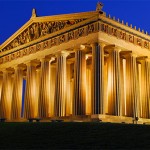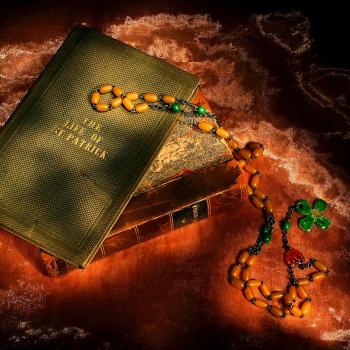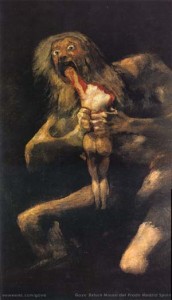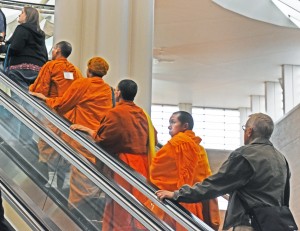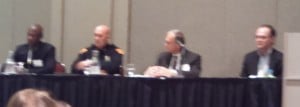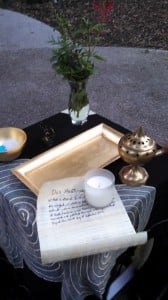“When you start on your journey to Ithaca, then pray that the road is long, full of adventure, full of knowledge.” (from “Ithaca” by Constantine Cavafy)
On Wednesday I attended the funeral of my venerable friend, Dr. Hal French, along with 400 or more others. The ceremony was grand, loving, thought-provoking and tender, with three lovely hymns, three eulogies and a magnificent organ-recital piece at the close. The line to greet family stretched through and in and out of several buildings; waiting was the occasion for reconnecting with many friends, some not seen for years. I never made it to the end of the line, eventually returning to work with regret, but having made my presence known by signing the family’s guest register.
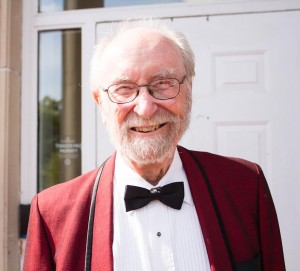 For years I had heard Hal’s name around town, around the Unitarian Universalist congregation where I was then a member, and on the University of South Carolina campus where Hal was faculty and I a student. I took his comparative religions course in my last semester, spring of 1993, and we struck up a friendship then. At the time, Hal was helping to launch the 100th anniversary convocation of the Parliament of the World’s Religions. I was entranced by his lectures on the many ways that people around the world connect with spirit. Three years ago I found myself part of a new state interfaith group along with Hal who, despite his supposed retirement in the 90s, was still teaching, still active, and nearing the publication of the 11-volume Encyclopedia of Hinduism. (I learned this week that the Dalai Lama attended the Indian event for the release of the Encyclopedia of Hinduism.) This excerpt from his bio in the funeral program speaks of the breadth of Hal’s life work:
For years I had heard Hal’s name around town, around the Unitarian Universalist congregation where I was then a member, and on the University of South Carolina campus where Hal was faculty and I a student. I took his comparative religions course in my last semester, spring of 1993, and we struck up a friendship then. At the time, Hal was helping to launch the 100th anniversary convocation of the Parliament of the World’s Religions. I was entranced by his lectures on the many ways that people around the world connect with spirit. Three years ago I found myself part of a new state interfaith group along with Hal who, despite his supposed retirement in the 90s, was still teaching, still active, and nearing the publication of the 11-volume Encyclopedia of Hinduism. (I learned this week that the Dalai Lama attended the Indian event for the release of the Encyclopedia of Hinduism.) This excerpt from his bio in the funeral program speaks of the breadth of Hal’s life work:
“Dialogue with other religious traditions was a vital part of his professional and personal life. Dr. French’s professional activities have included presentations and offices held in the American Academy of Religion, The Association for Asian Studies and interfaith associations such as the North American Interfaith Network, The International Interfaith Centre in Oxford, England, The World Congress of Faiths, Interfaith Partners of South Carolina and the World Parliament of Religions. Since 2011 he has been Chair of the U.S. Chapter of the International Association for Religious Freedom, the world’s oldest international interfaith organization.”
I was one of many students who recognized in Hal a guiding spirit. I turned to him for reflection and advice as I came to the end of both my college years and a troubled marriage. Like all gifted teachers, he asked more questions than he gave information, understanding the Socratic process by which we may discover our own wise depths. His peaceful calm and gentle sense of humor were a kind of sanctuary amidst the world’s intensities.
The best part of Hal’s funeral was observing the visibly-diverse crowd present. One eulogist (Cherry Hill Seminary 2013 symposium attendees will remember Dr. Carl Evans, Chair Emeritus of Hal’s Department of Religious Studies) read emails he had received from nine different religious groups, including Sikh, Native American, Jewish, Ba’hai, Pagan, Christian, Unitarian Universalist, Muslim and Hindu. Carl said of Hal’s passion for the world’s religions that “Hal knew that there was food at other tables and he did not hesitate to approach those tables and eat.”
Hal inculcated in many of us his understanding of what it takes to engage in interfaith. He often said, “The world is my village.” He also understood that everyone in interfaith dialogue must be deeply rooted in our own religion in order to recognize the truth in others. Hal, himself, never forgot his own roots (Kansas, Christian), but maintained memberships in both the Methodist church and a UU congregation, and was well-known and loved at many other places of worship, including the Hindu Temple, of course. At his wife’s request, the last words Hal heard on his deathbed were his favorite poem, Cavafy’s Ithaca. Reading it, I can almost smell the salt breeze, feel the excitement of beginning a long journey. I’m so grateful that Hal was part of my journey, and I wish him well in this next leg of his own.
As you set out for Ithaka
hope the voyage is a long one,
full of adventure, full of discovery.
Laistrygonians and Cyclops,
angry Poseidon—don’t be afraid of them:
you’ll never find things like that on your way
as long as you keep your thoughts raised high,
as long as a rare excitement
stirs your spirit and your body.
Laistrygonians and Cyclops,
wild Poseidon—you won’t encounter them
unless you bring them along inside your soul,
unless your soul sets them up in front of you.
Hope the voyage is a long one.
May there be many a summer morning when,
with what pleasure, what joy,
you come into harbors seen for the first time;
may you stop at Phoenician trading stations
to buy fine things,
mother of pearl and coral, amber and ebony,
sensual perfume of every kind—
as many sensual perfumes as you can;
and may you visit many Egyptian cities
to gather stores of knowledge from their scholars.
Keep Ithaka always in your mind.
Arriving there is what you are destined for.
But do not hurry the journey at all.
Better if it lasts for years,
so you are old by the time you reach the island,
wealthy with all you have gained on the way,
not expecting Ithaka to make you rich.
Ithaka gave you the marvelous journey.
Without her you would not have set out.
She has nothing left to give you now.
And if you find her poor, Ithaka won’t have fooled you.
Wise as you will have become, so full of experience,
you will have understood by then what these Ithakas mean.
Translated by Edmund Keeley/Philip Sherrard
(C.P. Cavafy, Collected Poems. Translated by Edmund Keeley and Philip Sherrard. Edited by George Savidis. Revised Edition. Princeton University Press, 1992)


